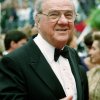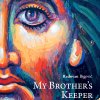Karl Malden (born Mladen George Sekulovich; Serbian Cyrillic: Младен Ђорђе Секуловић; March 22, 1912 – July 1, 2009) is an Oscar-winning American actor, starring in such films as A Streetcar Named Desire and On the Waterfront, with the late Marlon Brando. He also starred in another blockbuster movie, Patton, before his best-known role, playing Lt. Mike Stone on the popular 1970s crime drama, The Streets of San Francisco. He also played Archie Lee Meighan in Baby Doll and as Zebulon Prescott in How the West Was Won both starring Carroll Baker.
Malden was born in Gary, Indiana, to a Bosnian Serb father, Petar Sekulovich, who left San Francisco, California in 1910, to move to Eastern Indiana, where he worked as a factory worker in the steel mills, and Minnie Sevarian, a Czech mother, who was a seamstress. The Sekulovich family roots trace back to the city of Bileca in Herzegovina.
He first appeared as an actor on Broadway in 1937, then did some radio work, before becoming a movie character actor in 1940, where his first film was They Knew What They Wanted (1940). He also attended the Group Theatre where he began acting in many plays and was introduced by a young Elia Kazan, who would soon work with him on A Streetcar Named Desire (1951) and On the Waterfront (1954). His acting career was interrupted by World War II and Malden served as a noncommissioned officer the US 8th Air Force. While in the War, he was offered a small and important role in Winged Victory (1944). After the war in 1945, he resumed his acting career, receiving yet another small role in the play, Truckline Cafe, with a young, unfamiliar actor, Marlon Brando. Jobs were getting harder to find for him as he was in his mid-30s and was about to give up. He received a costarring role in the play, All My Sons with the help of director, Elia Kazan. With that success, he would then transfer into movies.
Malden has resumed his film acting career in the 1950s, starting with The Gunfighter (1950), which followed by Halls of Montezuma (1950). The following year, he starred in A Streetcar Named Desire (1951), On the Waterfront (1954), and Baby Doll (1956). Before and after he arrived in Hollywood, he starred in dozens of films of the late 1950s to the early 1970s, such as, Fear Strikes Out (1957), Pollyanna (1960), Birdman of Alcatraz (1962), How the West Was Won (1962), The Cincinnati Kid (1965), and Patton (1970) (playing Gen Omar Bradley), Summertime Killer (1972) and The Hijacking of the Achille Lauro (1989).
After years of starring in films and in stage work, he gained greater fame in 1972 by playing a detective in a 2-hour movie called The Streets of San Francisco. Producer Quinn Martin hired an unfamiliar actor, Michael Douglas, to play Malden's partner, and the show took off from there. During its first season, it acquired highest ratings among many other 1970's crime dramas; the chemistry of both Malden & Douglas were clicking together. In fact, while Streets was on the air, both in real-life and on the show, Malden became like a second-father to co-star (Michael Douglas); as they were actually the best friends. Co-star (Michael Douglas) wanted to congratulate his longtime mentor and friend of more than 30 years for Malden's performance. At the same time, he also presented the Lifetime Achievement Award to his co-star at the 2003 Screen Actors Guild Awards, for Malden's six decades of acting. On many episodes, both Malden & Douglas would perform a lot of car chasing scenes and a lot of detective work; as well. For his work as Lt. Stone, Malden was nominated for Emmys twice between 1976 and 1977, for Outstanding Lead Actor in a Drama Series; but he only won one Emmy in 1976.
Karl Malden won the 1951 Academy Award for best supporting actor for A Streetcar Named Desire and was nominated in 1954 for his supporting role in On the Waterfront. Karl Malden is a past president of the Academy of Motion Picture Arts and Sciences. In October of 2003, Malden was named the 40th recipient of the Screen Actors Guild's Life Achievement Award for career achievement and humanitarian accomplishment.





